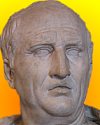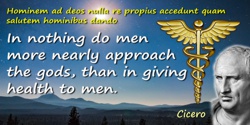 (source)
(source)
|
Marcus Tullius Cicero
(3 Jan 106 B.C. - 7 Dec 43 B.C.)
Roman philosopher and statesman who is noted for his exceptional skills in oratory, which began early with a career in law. He introduced Greek philosophy to ancient Rome through his treatises based on Plato, Aristotle, and others. Fifty-eight of his orations and more than nine hundred of his letters have survived, giving one of the clearest pictures of his personality of any Roman.
|
Marcus Tullius Cicero
“A mind without instruction”
Illustrated Quote - Large (800 x 400 px)
More Marcus Tullius Cicero quotes on science >>
The subject quote (above) comes in a passage from Tusculan Disputations, in which Marcus Cicero defends philosophers, when questioned about poor examples among them. In the form above, the quote is found in a number of books of quotations.
To see the quote more in context, here is a longer extract, showing the way J.E. King translated the passage (1927):
“…not all cultivated fields are productive, and the dictum of Accius is false:
Of its own nature bear a shining crop,
and in the same way not all educated minds bear fruit. Moreover, to continue the same comparison, just as a field, however good the ground, cannot be productive without cultivation, so the soul cannot be productive without teaching. So true it is that the one without the other is ineffective. Now the cultivation of the soul is philosophy; this pulls out vices by the roots and makes souls fit for the reception of seed, and commits to the soul and, as we may say, sows in it seed of a kind to bear the richest fruit.”1
This can be compared with the translation by Andrew P. Peabody (1886):
“…for as all cultivated fields are not harvest-yielding, and as there is no truth in what Attius says,—
It springs and ripens by its innate virtue,’
so all cultivated minds do not bear fruit. To continue the figure: as a field, though fertile, cannot yield a harvest without cultivation, no more can the mind without learning; thus each is feeble without the other. But philosophy is the culture of the soul. It draws out vices by the root, prepares the mind to receive seed, and commits to it, and, so to speak, sows in it what, when grown, may bear the most abundant fruit.”2
Yet another translator, Charles Duke Yonge, puts it this way:
“…for as all the fields which are cultivated are not fruitful, (and this sentiment of Accius is false, and asserted without any foundation,
To yield a crop good seed can never fail:)
it is not every mind which has been properly cultivated that produces fruit; — and to go on with the comparison, as a field, although it may be naturally fruitful cannot produce a crop, without dressing, so neither can the mind, without education; such is the weakness of either without the other. Whereas philosophy is the culture of the mind: this it is which plucks up vices by the roots; prepares the mind for the receiving of seeds, commits them to it, or, as I may say, sows them, in the hope that, when come to maturity, they may produce a plentiful harvest.”3
For those readers wishing to read Cicero’s words in the original Latin:
“…nam ut agri non omnes frugiferi sunt, qui coluntur, falsumque illud Accii:
Fruges, tamen ipsae suapte natura enitent,
sic animi non omnes culti fructum ferunt. Atque, ut in eodem simili verser, ut ager quamvis fertilis sine cultura fructuosus esse non potest, sic sine doctrina animus. Ita est utraque res sine altera debilis. Cultura autem animi philosophia est: haec extrahit vitia radicitus et praeparat animos ad satus accipiendos eaque mandat iis et, ut ita dicam, serit, quae adulta fructus uberrimos ferant.”1
2 Andrew P. Peabody (trans.), Cicero’s Tusculan Disputations (1886), Book II, 96. (source)
3 Charles Duke Yonge(trans.), The Tusculan Disputations: Marcus Tullius Cicero, Book II. (source)
- Science Quotes by Marcus Tullius Cicero.
- More for Marcus Tullius Cicero on Today in Science History page.
- Marcus Tullius Cicero - context of quote “A mind without instruction” - Medium image (500 x 250 px)







